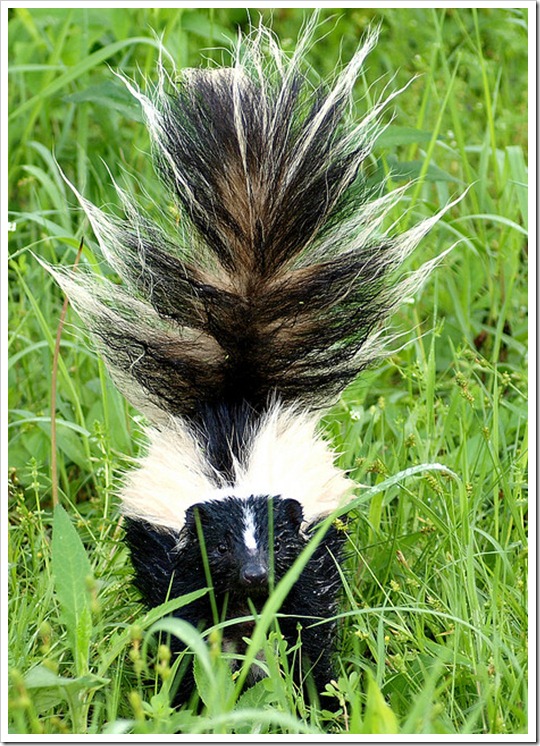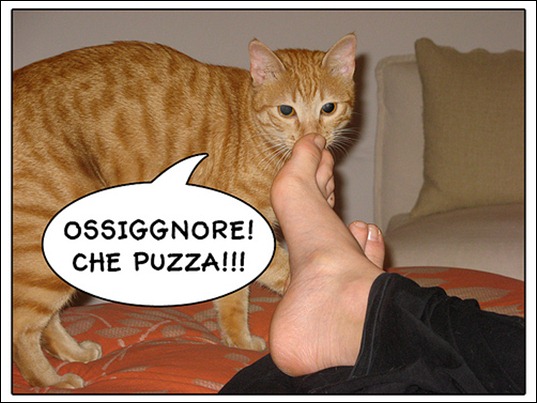A Very Smelly Blog! Posted by Geoff on Feb 2, 2015 in Italian Language
Inspiration can arrive from the strangest of places or event. Take the other day for example, when our sweet little kitten Ambra deployed one of her deadly Weapons of Mass Destruction whilst we were sitting enjoying our afternoon coffee. Yes, Ambra paid an urgent visit to her lettiera (litter tray), and was so moved by the puzza that she had unleashed that she ran across the kitchen, completed a lap of the table, claws scrabbling and slipping on the tight curves, and, using the power of the centrifugal force generated by her circuit, flew up onto the window sill where she asked to be let out a.s.a.p. A few seconds later we discovered the motive for her frantic haste as the incredible odore puzzolente hit us with its full force. Eyes watering, we followed Ambra’s example, and exited post haste …. mamma mia Ambra, che puzza hai fatto!
Well, ogni medaglia ha il suo rovescio (every cloud has a silver lining), and once I regained my composure I began to see the merits of a smelly blog ……..
Let’s take a look at some of the words that we use to talk about smell:
Odore
odore = odour/smell. Odore is pretty much neutral. People or things may have un odore di pulito = a fresh or clean smell, un odore di bruciato = a burnt smell, un odore sgradevole = an unpleasant smell, un buon odore = a good smell, un odore ripugnante = a foul or offensive odour, un cattivo odore = a bad smell, e.g.:
che buon odore, cosa stai cucinando di buono? = what a lovely smell, what nice thing are you cooking?
dopo l’incendio c’era rimasto un odore di bruciato per diversi giorni = after the fire a burnt smell lingered for several days.
non mi piace usare quel prodotto, ha un odore ripugnante = I don’t like using that product, it smells foul
non ha nessun odore particolare = it doesn’t smell of anything in particular
in its plural form, gli odori is used as a culinary term to describe a mixture of aromatic ingredients used to flavour certain dishes, e.g.: prezzemolo, sedano, basilico, salvia, mentuccia, rosmarino, ecc. (parsley, celery, basil, sage, mint, rosemary etc.)
 |
| Rose profumate = scented roses. Photo (CC) by Rosa Dik.. |
Profumo
profumo (noun) = smell/perfume/scent denotes a pleasant smell, e.g.:
che buon profumo = what a lovely smell
sento un forte profumo di rose = I can smell a strong scent of roses
profumare (verb) = to perfume, profumarsi = to perfume oneself, e.g:
profumo le lenzuola con l’ammorbidente = I make the sheets smell nice with a fabric softener
mia nonna si profumava sempre di violetta = my grandmother always perfumed herself with the scent of violets
profumato = perfumed/scented e.g.
come sei profumato oggi! = you smell nice today!
una sostanza molto profumata = a very scented substance
 |
| La puzzola = the skunk. Photo (CC) Frank Boston. |
Puzza
puzza (noun) = stink. The counterpart of profumo, puzza is used for unpleasant smells. (You may also found it written with an –o at the end, i.e. puzzo), e.g.
che puzza merdosa! = what a shitty smell!
c’è una puzza orribile in questa stanza = there’s a horrible stink in this room
puzzare (verb) = to stink, e.g.:
questo formaggio puzza, buttalo via! = this cheese stinks, throw it away!
puzza is also used in a figurative sense, e.g.: questa storia comincia a puzzare, this tale/situation is begging to smell bad
puzzolente = stinking/smelly, e.g.
pesce puzzolente = smelly fish
una fognatura puzzolente = a stinking sewer

Build vocabulary, practice pronunciation, and more with Transparent Language Online. Available anytime, anywhere, on any device.





Comments:
Laurel Barton:
Che divertente! Amo questo post! Anche si pùo dire “Che cosa puzza” in modo sospettoso? i.e., something smells fishy?
Serena:
@Laurel Barton Salve Laurel, grazie per i complimemti.
Something smells fishy is “puzzare”, e.g. His explanation definitely smells fishy = la sua spiegazione mi puzza.
Saluti da Serena